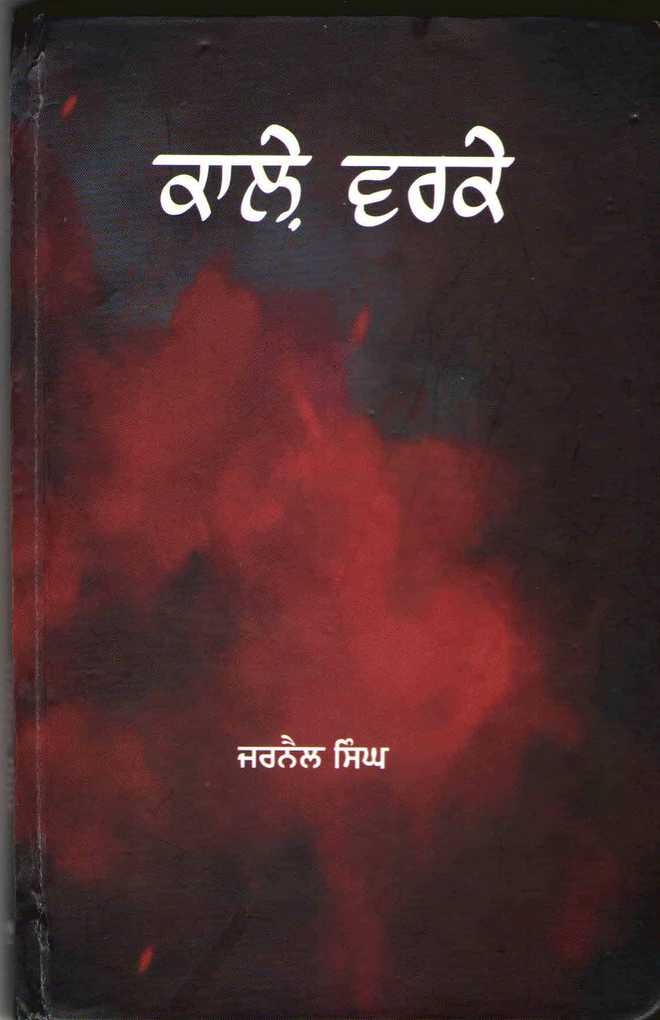
Kaale Varke by Jarnail Singh. Lokgeet Parkashan.
Jaspal Singh
Toronto-based Punjabi writer Jarnail Singh has published seven collections of short stories, the latest being Kaale Warke (The Black Pages). One of his collections, Do Tapu (Two Islands) has been translated into Hindi as well, besides being transliterated into the Shahmukhi (Urdu-Persian) script. Another collection Tawars (The Towers) has had multiple editions and is still in demand. It is not for nothing that Jarnail has received Dhahan Prize for 2016, the highest overseas award for Punjabi fiction launched by Vancouver-based Punjabi millionaire Barj Dhahan. This award carries the prize money of 25,000 Canadian dollars, which is more than the prestigious Jnanpith Award given in India for literary achievements.
Kaale Varke is a collection of five long stories published by Lokgeet Parkashan, Mohali, which unfolds the tragic black spots in the socio-economic system of America and Canada. No doubt the establishment in both these countries tries to conceal the bitter reality under the glamorous sheen of their material development.
The first story in this collection ‘Harh’ (The Deluge) deals with devastation caused by the hurricane Katrina in the town of New Orleans (USA) in August 2005. Thousands of hapless people perished in the floods unleashed by the hurricane and thousands more are still unaccounted for. A Punjabi boy, Sukhpal, runs two very successful restaurants there. But his greed for money takes a toll on everything that he owns. He does not evacuate in time despite repeated warnings by the state communication system. Everything that he built with the hard labour of years gets washed away. His American wife, who tries to escape with her friend, loses her son in the floods. Sukhpal saves his life with great difficulty. But when he discovers his wife in a hospital without the child he is furious and in a fit of rage he rejects her and leaves for an unknown place as a pauper. She blames him, his greed for the plight. Faulty engineering assignments by the rapacious companies are also ruthlessly exposed.
‘Kaale Varke’ the story that lends its title to this collection is about another kind of devastation. The author here moves from the natural disaster to ethnic and psychological disaster caused by the ill-conceived policies of the Canadian Government. These policies are about the rehabilitation of the ethnic Indian community (original natives) of Canada. The Government of Canada devises a scheme for the upliftment of the community by opening residential schools for their children. The government hopes that with modern education the community could be brought into the mainstream of the Canadian life. Christian missionaries are given authority to run these schools.
The gambit brings forth the corruption and degradation of the system, which is manned by the morally corrupt in the garb of religious missionaries. The brothers (catholic teachers) in the schools sexually exploit boys and girls that leave many of them as psychic wrecks for the rest of their life. When the Canadian Government learns about these heinous crimes, it institutes an enquiry. Consequently, the schools are shut down, the ailing students are counseled and a handsome compensation with an apology is made.
Yet another poignant tale ‘Patyan Naal Dhake Jism’ (The Bodies Covered with Leaves) deals with the obscene glamour of the modelling world that reduces a woman to an object. An Indian-origin Canadian resident Manisha, who is one of the top models, reaches Los Angeles to take part in a fashion show, where girls are forced to cover their private parts with a few leaves. She does this with a lot of grace, yet she loses the competition because her rival ‘outsmarts’ her by other immoral means.
‘Muhaaj’ (The Warfront) is a story about a family, whose head goes to fight the Afghan war as a member of the NATO forces. This brave and decorated soldier is killed in the war. His middle-aged widow Nancy is now bringing up her two young sons. The elder one Tim is so shocked by the death of his father that he loses his mental balance and Nancy has to seek constant counselling for his treatment. This story unfolds the injuries caused by the war and its disastrous consequences.
The last story ‘Nadeen’ (The Weeds) deals with a situation that every resident of Punjab can relate to. Thousands of boys are making desperate efforts to migrate to Canada and other Western countries. They can use any fair or foul method towards this end. Several fraud deals, involving millions of rupees, unethical alliances and ill-conceived misadventures like that of the ‘Malta Tragedy’ go into sending people abroad illegally. Back in India, their close relatives prey on their lands. The tragedy and farce are presented in meticulous detail.
Jarnail’s contribution to modern Punjabi story has been unrivalled. ‘Dhahan Foundation’ is not wide of the mark in nominating him for their coveted award.



























